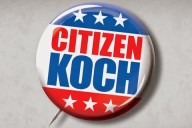Interview: Robert Kenner of “Merchants of Doubt”
Posted on March 22, 2015 at 7:03 am

Robert Kenner’s Merchants of Doubt is a deeply unsettling documentary about the way corporations divert money they should be spending on making better products more effectively to spend it instead on undermining science and scientists. By creating fake “public interest” groups with generic names to argue that scientific findings are not sufficient to take action they use the tactics perfected by the tobacco companies to delay government action for decades while people suffer the consequences. These days, that primarily means “selling” the idea that there is not a scientific consensus on the reality and the causes of climate change, but it applies to many other scientific findings as well. The scientific method is rigorous, checked and counter-checked, and ruthlessly truthful, with no other agenda but the facts. This is the method that produces all advances in technology and medicine. These efforts to devalue and undermine science by selling doubt the way corporations sell products obstruct efforts at the most fundamental level to establish policies based on the latest and most documented understandings of how the world works.
Writer/director Robert Kenner (“Food, Inc.”) said that while much of the film focuses on the fossil fuel companies’ efforts to discredit the science of climate change, “It is not about any specific industry. It’s about a group of very talented individuals who honed their craft in tobacco and were able to take the most difficult subject, a product that they knew was cancer causing, and for 50 years maintain doubt about it. They couldn’t say it doesn’t cause cancer because it’s a lie. They could say, ‘We don’t have enough science. We need to do more study.’ It’s the ‘doubt and delay’ tactic. So, they would switch the subject and say, “You’re taking our freedom away. We should be allowed to smoke on airplanes.” We had people picketing at Washington’s National Airport saying, ‘We demand the right to smoke on airplanes. You’re taking our freedom.’ So what’s interesting is on one hand we think of tobacco slightly as an old hat subject but what’s interesting is that playbook that was created lives on exactly the same way today. What’s so interesting is not only is it a lot of the same people but it’s the same very specific tactics.” He says it is a kind of “anti-Enlightenment.”
The industry-sponsored consultants who fabricate “interest groups” with uncredentialed “experts” are the primary culprits in the film, but one of its most significant and disturbing revelations is the complicit nature of the media, whose reflexive commitment to “showing all sides” means that they will bring on any contrarian without checking the legitimacy of the source, training, expertise, or conflicts of interest. “The real battle here is I don’t think newspapers should be putting people who play scientists on television, quoting them as equals. I think the media is playing a role in encouraging false debate. There’s always going to be one guy out there arguing that the earth is flat but that does not mean the question is not settled.”
So it is especially gratifying to see an exception in the film’s portrayal of two Chicago Tribune investigative reporters who spent two years on a brilliant expose of fraud, misrepresentation, and fake science funded by the tobacco and chemical industries that led to fire retardant regulations that (1) didn’t work and (2) exposed infants to toxic chemicals.
But Kenner points out that there are “fewer and fewer and fewer” news organizations able to devote those kinds of resources to exposing these corporate scams. “There are now 4.5 PR representatives for every journalist. When I started out there were far more journalists than PR Reps. So as people get fired from their newspapers they get hired by the very companies that they might have investigated.”
This should not be a political issue, he says. “I talked to George Schultz and he said the greatest thing he and Ronald Reagan did was the international ozone treaty. He said, ‘We didn’t know 100% but we were in the high 90’s and it was the right thing to do. We had to take action. It was a great insurance policy.’ And Nixon created the Environmental Protection Agency, and George Bush with acid rain — so there is a tradition of conservative environmental protection. We might all hate the EPA for being such nags, but the air and water are cleaner and so we are lucky they are there.”
He also insists that it is not an anti-corporate film. “It’s really important to say that corporations are in the best position to be the solution.”


